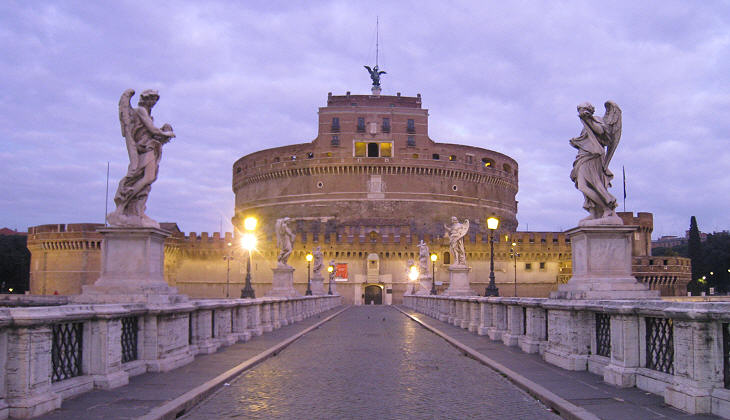
Italian 352 – Rome / Winter 2022
T/Th 1:30 to 3:20
Prof: Albert Sbragia
Denny 213
January 4 and 6 we will meet on Zoom at:
https://washington.zoom.us/j/91063502161
Office hours: T 3:30-4:20 / Th 4:30-5:20
C-262 Padelford Hall
This course provides an overview of the cultural and artistic history of Rome from its origins to the present. It has been designed for students interested in gaining a comprehensive knowledge of Rome and its unique status in Italian cultural history and beyond, and for students considering study at the UW Center in Rome in one of the many programs offered by various UW departments. Literary and historical documents, visual arts and architecture will be used to explore the changing face of the Eternal City, its myths and its imagery, from the legendary founding by Romulus, through the Classical and Renaissance periods, to Mussolini’s fascist Rome and the modern Italian city. Rome is one of the world’s most important historical, intellectual and cultural centers and the study of Rome offers a unique point of entry into Italian cultural as well as the diverse historical, artistic and cultural traditions which have invested the city and the Italian peninsula as one of the key sites for the development of Western civilization and beyond.
By the end of the course, students will demonstrate the ability to:
*discuss the historical evolution and cultural impact of the city of Rome and Italy across the millennia
*explore the intersection of art and film with urban studies and politics
*engage in close readings, analysis and discussion of historical and literary texts
*write concise, expository essays with regard to central themes in the course
*prepare for and navigate timed examinations on comprehensive subject material
*travel to Rome and Italy and experience them in an informed and engaged manner
Assignments, evaluation and grading:
Preparation and in-class participation and discussion 20%
Essay paper 1 (2-3 pages)—due January 18 20%
Midterm examination—February 1 20%
Essay paper 2 (2-3 pages)—due February 22 20%
Final examination—March 18 20%
This course will be taught in Denny 213 during established class hours or on Zoom as determined by the UW. Currently the first week of class will be on Zoom with the hope of returning to the classroom for week 2 and beyond. Students should go to the Assignments page to see what needs to be prepared in advance of each lesson. Lessons will focus on the presentation and class discussion of history, art and architecture, and primary readings. Students are expected to complete all assigned readings prior to the classroom lesson.
Readings:
Secondary readings on the history and art of Rome are accessible by link on the Assignments page for each lesson. These readings help prepare the students for lectures and should be completed before class.
Primary readings are included in the Rome Reader. You should purchase this reader asap at Professional Copy Center, 4200 University Way NE, (206) 6342689. Each reading is accompanied by a list of things to look for which will help guide our discussion of these readings in class. Students should read each reading closely: underlining/highlighting, identifying key passages with relation to study questions or essay questions, being prepared to ask questions and respond to them are to be completed prior to class. Since there is a fair amount of reading for each lesson please budget appropriate time.
Preparation at home and participation in class are a key component grade.
Essay papers will be based on questions given to students by the instructor and will be written in word format and handed in in class on the date due (if we continue to remain with UW Zoom protocol during the quarter they will be uploaded onto Canvas). Midterm and final exams will be comprehensive for the material studied in the first and second halves of the quarter and will involve multiple choice questions, identification paragraphs on terms and images and an essay on a assigned topic. All PowerPoint images and other materials used by the instructor will be available for students to review on the course Canvas page under Files.
Office hours are T 3:30-4:20 and Th 4:30-5:20. I'm also happy to meet with students by Zoom if those office hours do not fit into your schedule or if we are not meeting on campus.
The class schedule is as follows:
|
Date |
Homework Assignments |
Class Lesson |
|
Week 1 T 1/4 |
Review course canvas page and syllabus |
Introduction to Course. Early Rome: Topography, Etruscans
|
|
Th 1/6 |
Canvas: Western Civilization (WC): 153-166 Rome Reader: Livy, Early History of Rome, pt. 1
|
Discussion of Livy From the Founding Legends to Monarchy to Roman Republic |
|
Week 2 T 1/11 |
Rome Reader: Livy, Early History of Rome, pt. 2 Canvas: WC 166-188
|
Discussion of Livy Later Roman Republic |
|
Th 1/13 |
Canvas: WC 193-201 Rome Reader: Augustus—Res Gestae / Virgil—Aeneid |
End of Republic—Augustus and Empire Discussion of Augustus and Virgil
|
|
Week 3 T 1/18 |
First Paper Due Canvas: WC 201-213; Khan Academy, Roman Architecture
|
Early-Mid Roman Empire and the Roman Architectural Revolution |
|
Th 1/20 |
Rome Reader: Tacitus—Annals (Nero) Canvas: WC 213-221
|
Discussion of Tacitus Roman Religions and Early Christianity
|
|
Week 4 T 1/25 |
Canvas: WC 227-243 Rome Reader: Constantine and Licinius, Edict of Milan
|
Later Empire / Constantine and Christianity |
|
Th 1/27 |
Canvas: WC 243-255 Rome Reader: Augustine, City of God |
Discussion of Augustine Fall of Roman Empire
|
|
Week 5 T 2/1 |
Review for Midterm |
Midterm Exam |
|
Th 2/3 |
Midterm class break: No lesson |
Midterm class break: No lesson
|
|
Week 6 T 2/8 |
Canvas: WC, 399-402 Rome Reader: Dante, Inferno Cantos 1 and 34
|
Rome from Middle Ages to Return of the Papacy Discussion of Dante Alighieri
|
|
Th 2/10 |
Canvas: WC, 437-444 / Stinger, The Renaissance in Rome, 1-13 Rome Reader: Petrarch, Letter to Posterity
|
Papal Rome: Early Renaissance Art Discussion of Petrarch |
|
Week 7 T 2/15 |
Canvas: WC, 448-450 / Gardner’s Art Through the Ages (excerpts) Rome Reader: Machiavelli, Discourses on Livy
|
Discussion of Machiavelli The High Renaissance in Papal Rome: Bramante and Raphael |
|
Th 2/17 |
Canvas: Gardner’s Art Through the Ages (excepts on Michelangelo) Rome Reader: Vasari, Lives of the Artists
|
The High Renaissance in Rome 2, Michelangelo |
|
Week 8 T 2/22 |
Canvas: WC 534-540 / Gardener’s Art Through the Ages (excerpts) Rome Reader: Council of Trent, On the Invocation, Veneration and Relics of Saints, and on Sacred Images Second Paper Due
|
Counter Reformation and Baroque Rome: Caravaggio and Bernini |
|
Th 2/24 |
Canvas: Honour. Neoclassicism (excerpts) Rome Reader: Goethe, Italian Journey |
Rome: the Grand Tour, Neoclassicism, and the French Revolution. Discussion of Goethe
|
|
Week 9 T 3/1 |
Canvas: Merriman, A History of Modern Europe 661-672 Rome Reader: D’Annunzio, Child of Pleasure
|
The Italian Risorgimento and Rome as the Capital of the Italian State |
|
Th 3/3 |
Canvas: Merriman, A History of Modern Europe (1017-1023, 1041-1044, 1062-1065, 1105-1106) Rome Reader: Mussolini, Doctrine of Fascism / speeches on Rome
|
Benito Mussolini and Fascist Rome |
|
Week 10 T 3/8 |
Film: La Dolce Vita (Federico Fellini) Canvas: Italy from 1945, Encyclopedia Britannica
|
Post World War II Italy and Rome: Reconstruction and Modernity. |
|
Th 3/10 |
Canvas: Italy from the 1960s, Encyclopedia Britannica |
Contemporary Italy and Rome |
Final Exam: Friday, March 18, 2:30-4:20
UW FRENCH AND ITALIAN GRADING SCALE
|
Percentage |
Point |
Letter |
|
100-96.5 96.4-94.5 94.4-92.5 |
4.0 3.9 3.8 |
A |
|
92.4-91.5 91.4-90.5 90.4-89.5 |
3.7 3.6 3.5 |
A- |
|
89.4-88.5 88.4-87.5 87.4-86.5 |
3.4 3.3 3.2 |
B+ |
|
86.4-85.5 85.4-84.5 84.4-83.5 |
3.1 3.0 2.9 |
B |
|
83.4-82.5 82.4-81.5 81.4-80.5 80.4-79.5 |
2.8 2.7 2.6 2.5 |
B- |
|
79.4-78.5 78.4-77.5 77.4-76.5 |
2.4 2.3 2.2 |
C+ |
|
76.4-75.5 75.4-74.5 74.4-73.5 |
2.1 2.0 1.9 |
C |
|
73.4-72.5 72.4-71.5 71.4-70.5 70.4-69.5 |
1.8 1.7 1.6 1.5 |
C- |
|
69.4-68.5 68.4-67.5 67.4-66.5 |
1.4 1.3 1.2 |
D+ |
|
66.4-65.5 65.4-64.5 64.4-63.5 |
1.1 1.0 0.9 |
D |
|
63.4-62.5 62.4-59.5 |
0.8 0.7 |
D- |
|
59.4-0.0 |
0.0 |
E |
ACADEMIC STANDARDS:
Students are expected to maintain a high standard of academic ethics, honesty and integrity. Academic misconduct includes but is not limited to: plagiarism, cheating (which includes inappropriate use of internet--your papers and exams should be based on what we have done in class not what you find on the internet--internet-based answers will result in a zero grade), harassment, and disruptive or offensive behavior, and will not be tolerated. Any student or situation found to be in violation of proper academic conduct will be addressed according to University policy and procedures. Please refer to the University’s Student Conduct Code.
POLICY REGARDING STUDENT CONCERNS:
Please see your instructor about concerns as soon as possible. If you are not satisfied with the response you receive, you may contact Geoffrey Turnovsky, Chair, in Padelford C-258/C-237 or at gt2@uw.edu.
ACCESS AND ACCOMODATIONS:
Your experience in this class is important to us, and it is the policy and practice of the University of Washington to create inclusive and accessible learning environments consistent with federal and state law. Disability Resources for Students (DRS) offers resources and coordinates reasonable accommodations for students experiencing a wide range of temporary and permanent disabilities and/or health conditions that may impact their ability to perform well in the classroom. These include but are not limited to; mental health, attention-related, learning, vision, hearing, physical, or other health impacts. If you are experiencing any such difficulties, please contact DRS as soon as possible. Once you have established accommodations, please submit them to your instructor at your earliest convenience so we can discuss your needs and success in this course.
RELIGIOUS ACCOMODATION:
It is the policy of the University of Washington to reasonably accommodate student absences or significant hardship due to reasons of faith or conscience, or for organized religious activities in accordance with Washington state law. The UW’s policy, including more information about how to request an accommodation, is available at Faculty Syllabus Guidelines and Resources. Accommodations must be requested within the first two weeks of this course using the Religious Accommodations Request form.
